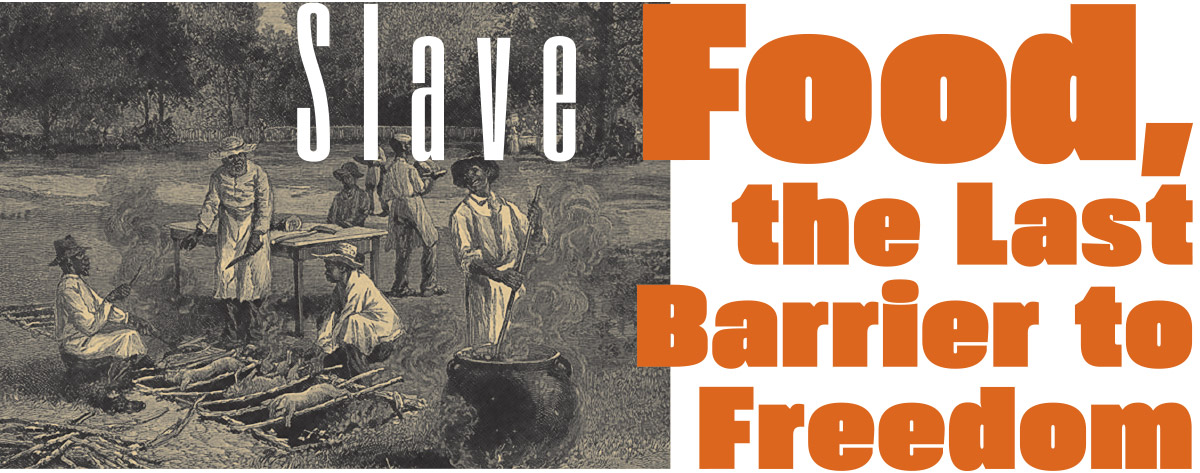

ronically, the Slave Food journey began at a meal among old college friends. The conversation was filled with laughter and stories from the past, when out of the blue, one friend asked an honest yet probing question: “What’s the deal with black people?”
As the words left his mouth, the table conversation quieted, and all eyes darted in his direction. “Why are we sicker?”
Our friend explained that he was urged to have a prostate check and a colon cancer screening at an earlier age than his white colleagues and when he asked his doctor the reason for the recommendation, the doctor said it was “because he was black.”
Because he was black? Those words awakened painful memories of family and friends who not only seemed to live sicker, but die sooner. I [Dr. Batiste] recalled my father’s battle with diabetes and how it shortened his life and health span, leaving a shell of the man. “Because he was black” reminded me of a post-slavery extinction theory: “Black people are inferior and their diseases are just a result of that inferiority…”.
In that moment, we decided to reject the hypothesis that black people in America must live sicker and die sooner because they are genetically inferior. We set out to find and prove an alternative hypothesis supported by scientific literature to unearth why black people live sicker and die sooner. See table 1
What is evident after reviewing the literature is that disparities in health hold true irrespective of education, celebrity status, or financial wealth. The human genome project (circa 1990) revealed that 99.9% of our DNA is shared with each other human on this planet. The few differences that exist between racial groups reflect differences in the environment and external factors, not core biology. https://www.genome.gov/genetics-glossary/Race and http://sitn.hms.harvard.edu/flash/2017/science-genetics-reshaping-race-debate-21st-century/
- 80% of African American Women are overweight or obese compared to 64.8% non-Hispanic whites.
- 42% of African American adults over the age of 20 suffer from hypertension compared with 28.7% non-Hispanic whites.
- 60% of African American adults are more likely than non-Hispanic white adults to have been diagnosed with diabetes by a physician and 5 times more likely to be diagnosed with diabetes related end stage renal disease as compared to non-Hispanic whites.
- 20% of African Americans are more likely to die from heart disease than non-Hispanic whites
- 50% of African Americans are more likely to suffer a stroke (cerebrovascular disease), as compared to their white adult counterparts.
- *60% of black men are more likely to die from a stroke as compared to non-Hispanic whites. African American women are twice as likely to have a stroke as compared to non-Hispanic white women.
- African Americans have the highest mortality rate for all cancers combined compared with any other racial and ethnic group.
2020 exposed these two dynamics—health and racial disparities—in black and white, if you will. The COVID-19 pandemic highlighted the increased disease burden African Americans carry. African Americans confronted racism in the stories of George Floyd, Brionna Taylor, and others. Each time the killing of an African American is reported, many viewing the tragic events see themselves, or their loved ones, as potential victims and the stress response is triggered over again. The events of 2020 trained our focus to these external events and stressors.
According to Stress in America 2020: Stress in The Time of COVID-19, Volume Two a study done by the American Psychological Association, 55% of black adults say discrimination is a significant source of stress. Seven in 10 Americans say police violence towards minorities is a significant source of stress. Studies have confirmed that racial insults do not have to be overt, many take the form of micro-aggressions as described by the everyday discrimination scale see see table 2. These small repetitive insults add up and damage our health. Racial stress has been associated with increased mental health issues, cancer diagnoses, heart disease, carotid artery narrowing, diabetes, obesity, infant mortality and shortened telomeres (a genetic marker of longevity).
- frequently treated with less courtesy than others
- frequently treated with less respect than others
- frequently receive poorer customer service than others
- frequently notice how people think you’re not smart
- frequently notice how people act like you are dishonest
- frequently notice how people act better than you
- frequently called names/insulted
- frequently threatened/harassed
During slavery, enslaved African Americans were fed the poorest quality food—what the slave owners refused to eat. While ‘massa’ ate “high on the hog,” the slaves’ diet came from the junk parts of animals. These parts included intestines, feet, and the snout of pigs as well as the neck, feet and gizzards of chickens. Biblically, all of the pig is unclean, and from a nutritional standpoint there may not have been much difference in the foot (slave’s food) or the loin (master’s food) of a pig per se. However, from a caloric standpoint there would have been a significant difference.
A plantation full of slaves would have to share the scraps from a pig and of course get very little of the plant foods that may have grown on the plantation. Frederick Douglas, in his memoire stated, “rations consisted of a monthly allowance of a bushel of third-rate corn, pickled pork (which was “often tainted”) and “poorest quality herrings” – barely enough to sustain grown men and women through their backbreaking labors in the field.”
Plantation owners fed enslaved persons only the refuse to maximize profits, while depriving them of enough nutritional energy to rebel or escape. We are the descendants of the most magnificent survivors. The hell they faced daily was intensified by the lack of nutrition they received. Yet after working all day in the fields many slaves would have a small plot of land where they would grow food and hence improve their survivability. The challenge of good nutrition did not stop our ancestors from building this country and contributing significantly to every part of its being.
Just as the institution of slavery was subsidized by the government that allowed it, so today are the chains of poor health subsidized by tax dollars for genetically modified crops such as corn, soy, and wheat grown by big agriculture. This food is linked with animal products and produced in unhealthy, unethical ways. Most of the animals eaten do not get to roam free, are fed antibiotics and even given steroids so they will grow faster and fatter.
This modern diet does not simply make one a slave by its deleterious effects on the body, but by its addicting effects on the mind. We recently discussed this with Michael Moss author of Salt, Sugar and Fat and the soon to be released, Hooked. Moss, an investigative journalist, has uncovered how the food industry designs foods to get us “hooked.” Using food science and an understanding of the brain’s reward centers, big corporations create or alter foods that can sit on the shelf for long periods of time and live up to the slogan, “once you pop, you can’t stop.’
We often turn to modern-day slave food for temporary comfort from the unrelenting stressors we experience. As one nutritionist says, “Stressed is desserts spelled backwards.” Eating desserts or dessert-like foods is a coping method for many who experience stress. These comfort foods that are rich in salt, sugar and fat add another layer of stress: nutritional stress.
Most of us have an emotional affinity to the foods we eat whether junk food, fast foods or “soul” food. African Americans are more likely to live near fast food restaurants, in food deserts ( areas with limited access to healthy food), and food swamps (abundant access to unhealthy food). Proximity to fast food has been associated with an increased burden of chronic disease.
A study done in Houston called the Project CHURCH research study led by Dr. Lorriane Reitzel shows that these neighberhood influences contribute to obesity and chronic diseas, especially for black women.
So, now, that we have begun to expose how food has been weaponized, you and your family can protect yourself by following a simple whole food plant-based diet. We will expound on this more in our next article for Message.
Eric Walsh, MD DrPH is a family medicine physician and public health expert who has worked in public health to create programs that protect vulnerable populations from disease.
THE SLAVE FOOD PROJECT:
two African American physicians explore the relationship between stress, racial discriminatory stress, and nutritional stress in the development of health disparities. These physicians discovered the keys to breaking the chains of disease and getting a taste of freedom through a whole food, plant-based diet.
THE SLAVE FOOD PROJECT:
two African American physicians explore the relationship between stress, racial discriminatory stress, and nutritional stress in the development of health disparities. These physicians discovered the keys to breaking the chains of disease and getting a taste of freedom through a whole food, plant-based diet.